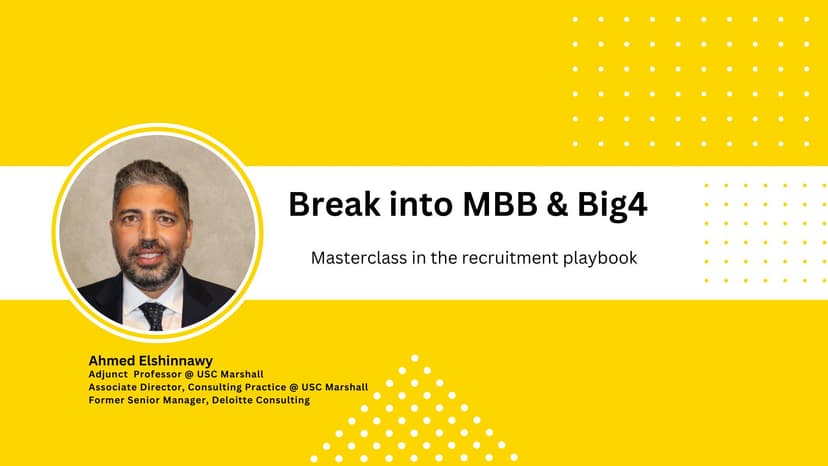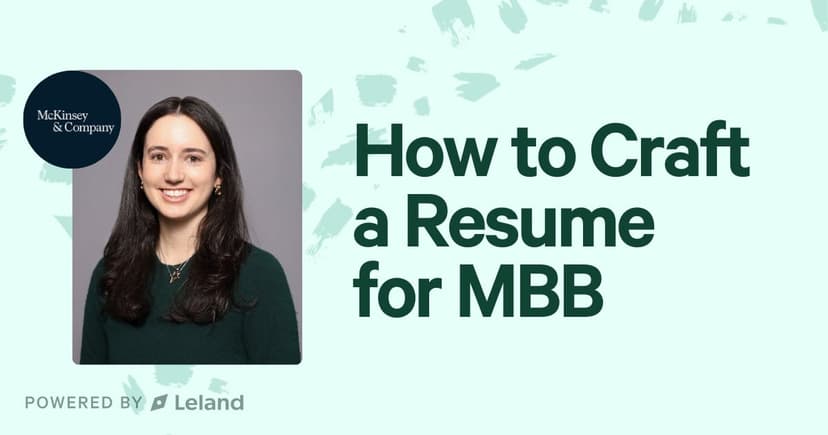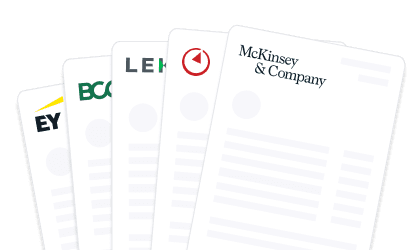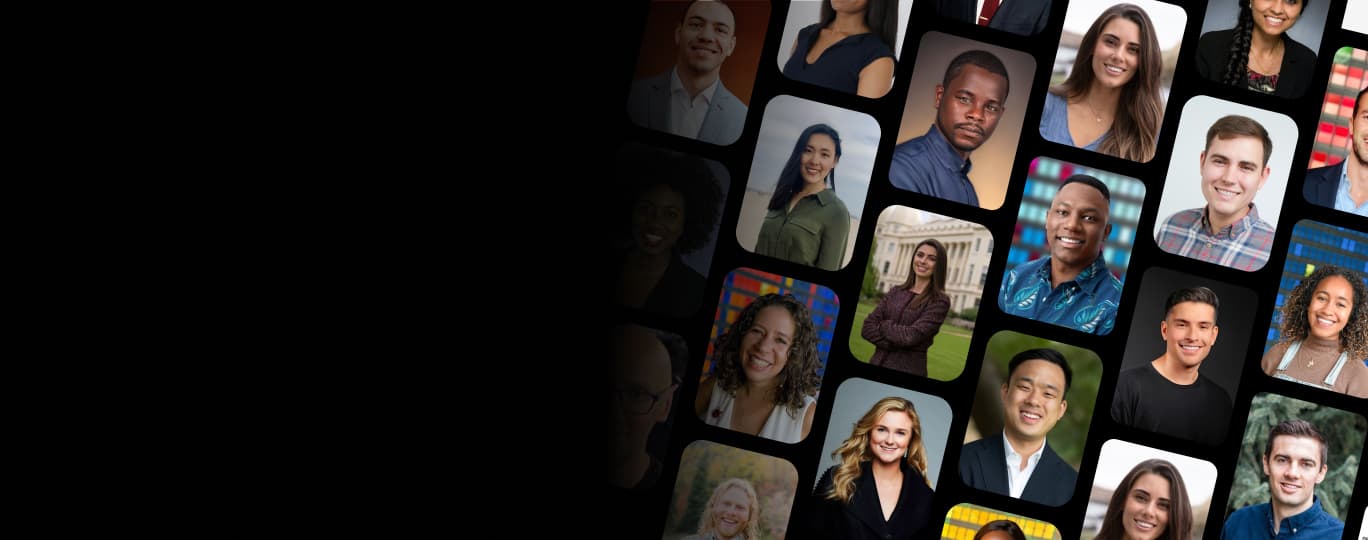IQVIA Interview: Process, Questions, & Case Studies
Ace your IQVIA interview with this step-by-step guide covering the full process, real case examples, and the exact questions they love to ask.
Posted February 5, 2026

Join a free event
Learn from top coaches and industry experts in live, interactive sessions you can join for free.
Table of Contents
If you're applying to IQVIA, you're likely aiming to break into one of the most specialized and impactful corners of consulting where healthcare, life sciences, and data-driven strategy meet. Whether you're coming from undergrad, post-MBA, or with a few analyst years under your belt, the IQVIA interview process is a chance to prove you can think critically, communicate clearly, and understand the business of health.
But here's the good news: this interview isn’t about memorizing frameworks or faking expertise. It's about showing you can ask smart questions, structure your thinking, and understand how to help clients improve outcomes in a complicated industry.
This guide breaks down exactly what to expect, the process, the types of questions, case examples, and how to stand out. Think of it as the prep you’d get from a coach who’s been in the room, knows what matters, and wants you to win.
What IQVIA Does and Who They Hire
IQVIA doesn’t expect you to be a healthcare expert, but they do expect you to think like a consultant who understands how business and science intersect.
What separates successful candidates isn’t a perfect resume or a PhD. It’s the ability to break down complex problems, communicate clearly, and stay composed when thrown into ambiguity. IQVIA’s interviews reward candidates who are structured, curious, and proactive, especially those who can ask the right questions, not just give the “right” answers.
Whether you're coming from undergrad, an MBA, or another analyst role, what matters most is that you can show three things:
- You understand how healthcare decisions are made (by payers, providers, pharma, etc.)
- You’re comfortable working with data to drive decisions, even if you're not a data scientist
- You can collaborate well across functions such as scientists, marketers, clinicians, and execs
If you can show those things in your interviews, you're already on the right track.
The IQVIA Interview Process
Timeline & Stages
| Stage | What to Expect |
|---|---|
| Application Review | Resume + cover letter screening. Some roles may also require academic transcripts. |
| Online Assessment (varies) | Occasionally used to assess basic logic or analytics (not always required). |
| First Round Interview | Typically one 30–45 minute case + behavioral component. |
| Final Round Interview | 2–3 back-to-back interviews (cases + fit), often with managers or senior consultants. |
| Offer | If successful, expect to hear back within 1–2 weeks after the final round. |
Virtual vs. In-Person
| Interview Format | Details |
|---|---|
| Virtual | Most first rounds are conducted over Zoom or Microsoft Teams. Make sure your tech setup is clean, and you’re ready to share screen for case work if asked. |
| In-Person | Final rounds may be in person, depending on the office or region. These tend to be more conversational and include time to meet the team. |
What Makes IQVIA Interviews Unique?
IQVIA interviews are traditional consulting cases with a healthcare twist and are designed to test how well you can operate in an environment that’s fast-moving, data-driven, and often highly technical.
While you’ll still need to structure problems and communicate clearly, expect a stronger emphasis on healthcare context and real-world logic over textbook frameworks. Here’s what stands out:
- Data-heavy cases: You may be given charts or datasets and asked to interpret them. Being comfortable with numbers is a must, but explaining what they mean for the client is even more important.
- Life sciences focus: Many cases are based on pharma, biotech, or medtech scenarios. You don’t need a science background, but you do need to speak intelligently about topics like market access, clinical trials, or payer strategy.
- Practical problem-solving: IQVIA cases often reflect actual work, not abstract puzzles. They care more about real-world thinking than flashy frameworks.
Show that you can think like a consultant in healthcare, and you’ll stand out.
Common IQVIA Interview Questions
IQVIA Behavioral Interview Questions
IQVIA’s behavioral interviews focus on assessing your interpersonal skills, adaptability, and alignment with the company’s values. Here are some commonly asked questions:
- Tell me about yourself.
- Why do you want to work at IQVIA?
- Describe a time when you had to work in a team.
- How do you handle tight deadlines?
- Tell me about a time you faced a challenging situation at work and how you dealt with it.
- What are your strengths and weaknesses?
- Where do you see yourself in five years?
These questions are designed to understand how you approach work situations and interact with others. Prepare by reflecting on past experiences that showcase your skills and values.
Technical/Analytical Questions
For roles that require analytical thinking and technical expertise, IQVIA may pose questions such as:
- How would you approach analyzing a new dataset?
- Explain a complex technical concept to someone without a technical background.
- Describe a time when you used data to make a decision.
- What tools and software are you proficient in for data analysis?
- How do you ensure data quality and integrity in your analyses?
These questions aim to assess your technical capabilities and how you apply them to real-world scenarios. Be prepared to discuss specific tools, methodologies, and experiences that highlight your analytical skills.
IQVIA Case Interview Breakdown
IQVIA’s case interviews are rooted in actual healthcare consulting projects, so expect problems that blend business strategy with life sciences context. Here are the common case types you might encounter:
- Pharma Strategy: You might be asked to help a biotech firm decide whether to launch a new therapy, evaluate market potential, or forecast revenue for a new drug class. Think market sizing, pricing, access barriers, and competitive landscape.
- Payer Strategy: Cases may involve helping a client navigate reimbursement challenges or optimize their formulary position. Be ready to analyze how different payers (commercial vs. government) impact access and revenue.
- Data Analytics: These cases test your ability to work with and interpret healthcare data — like patient population segments, adherence rates, or claims data. It’s not about doing heavy math, but about drawing insights that support decisions.
- Real-World Evidence (RWE): IQVIA is a leader in RWE consulting. You might be asked to assess whether real-world outcomes support continued investment in a treatment, or help a client design a post-market evidence plan to satisfy regulators or payers.
Sample Frameworks to Use
Forget memorized “profitability” frameworks. IQVIA cases require tailored, business-meets-science thinking. Here are 3 high-utility structures to adapt on the fly:
- Pharma Launch Framework
- Market Opportunity (size, unmet need, competitive products)
- Pricing & Access (payer incentives, reimbursement strategy)
- Clinical Fit (efficacy, safety, patient population)
- Internal Capabilities (sales force, partnerships, supply chain)
- Payer Strategy Framework
- Current Reimbursement Landscape
- Client's Value Proposition (cost-effectiveness, outcomes)
- Stakeholder Mapping (payers, providers, advocacy groups)
- Levers to Improve Access (rebates, value-based contracts, RWE)
- Data-Driven Insights Framework
- Objective: What is the client trying to achieve?
- Inputs: What data do we have (claims, EMR, patient surveys)?
- Analyses: What insights are needed (trends, outliers, correlations)?
- Implications: How do the findings drive action or decision-making?
Real IQVIA Case Study Examples
Case #1. Enhancing Diversity in Clinical Trials with AI
A leading biopharmaceutical company faced challenges in enrolling underrepresented populations in clinical trials. IQVIA addressed this by implementing its Fair Ranking with Missing Modalities (FRAMM) methodology, which leverages machine learning to optimize site selection and improve participant diversity.
This approach enabled the sponsor to make informed trade-offs between enrollment speed and diversity, leading to more representative trial populations.
Case #2. Scaling Clinical Research Platforms with React
IQVIA aimed to enhance its clinical research platforms, specifically Transparency Reporting and SmartSolve. By partnering with BairesDev, IQVIA integrated React components into these platforms, improving digital scalability and user experience.
This collaboration allowed IQVIA to address development backlogs and focus on other critical areas, resulting in a more cohesive and efficient digital infrastructure.
Case #3. Optimizing Oncology Trials with Bayesian Designs
In collaboration with the FDA's Project Optimus, IQVIA explored the use of Bayesian interval-based designs for Phase I dose-escalation trials in oncology. This innovative approach aimed to improve patient safety and trial efficiency by accurately estimating the Maximum Tolerated Dose (MTD). The methodology offers potential benefits for future clinical trials in cancer treatment development.
Expert Tips for Acing Your IQVIA Interview
How to Prepare If You’re New to Healthcare
You don’t need a biology degree to break into healthcare consulting, but you do need to understand the ecosystem and speak the language. If this is your first exposure to the space:
- Start with the basics: Learn how pharma companies develop, price, and launch drugs. Understand the roles of payers, providers, and regulators.
- Read recent case studies and industry news: IQVIA’s site, FiercePharma, and Deloitte’s Life Sciences reports are great resources.
- Practice healthcare-specific cases: Focus on market sizing for a new drug, access strategy, or interpreting patient data.
What Impresses IQVIA Interviewers
IQVIA interviewers look for candidates who are structured, insightful, and adaptable — especially in messy, real-world healthcare scenarios. What stands out most:
- Clear, structured thinking: Show how you break problems into parts and stay focused on the objective.
- Curiosity about healthcare: Be ready to talk about why this industry matters to you.
- Comfort with ambiguity and data: They want consultants who can work with incomplete info and still generate valuable insights.
- Team-ready mindset: IQVIA projects are cross-functional. Communicate like someone who can collaborate with analysts, scientists, and executives alike.
Always connect your insights back to real-world outcomes like cost savings, patient impact, or better access to care.
Do Your Best to Avoid These Mistakes
Here’s what can quickly tank an otherwise strong interview:
- Using generic frameworks: Avoid dumping a memorized profitability or 4Ps model onto every case. Customize your approach to the client and scenario.
- Overexplaining basic concepts: Don’t try to teach your interviewer healthcare 101. Focus on analysis and recommendations.
- Skipping the ‘so what’: Every insight should connect to a next step or business implication. Stating just facts is not enough, but tell them why it matters.
- Weak communication under pressure: Even if your logic is solid, fumbling the explanation or speaking in circles can hurt you. Practice thinking out loud clearly.
Practice with mock interviews, especially live ones. You’ll build confidence in thinking aloud, structuring your thoughts, and handling curveballs.
Work with a coach who knows what it takes! These experts specialize in helping candidates break into top healthcare and life sciences consulting roles.
Bottom Line
Don't be pressured when it comes to IQVIA interviews, because it's not about perfection. Instead, IQVIA interviews are about showing you can think clearly, learn quickly, and bring structure to complicated, real-world healthcare problems.
Whether you’re new to the industry or have some experience under your belt, what matters most is your ability to communicate with purpose, ask smart questions, and stay calm under pressure. You don’t need to memorize frameworks or fake expertise. You just need to show up prepared, curious, and coachable.
If you take the time to understand the healthcare landscape, practice real cases, and reflect on your past experiences, you’ll walk into your interview with confidence, and walk out with a serious shot at an offer. You’ve got this!
Ace Your IQVIA Interview with Expert One-on-One Coaching
While an IQVIA interview might seem intimidating, if you’ve gotten this far, it’s because you already have the background and experience they’re looking for. Now is just the time to show them you can put what’s on paper into practice. But don’t worry – we’re here to help.
Set up an intro call with one of our expert management consulting coaches. They have the skills and experience to guide you through the process of preparing for your upcoming interview so that you can showcase the best you have to offer as a candidate.
Read next:
- How to Get Into the Google APM Program
- An Expert’s Guide to Resumes: Five Tips to Make You Stand Out
- The 10 Best MBA Programs for Product Management
- Is Product Management a Good Career? PMs From Top Companies Weigh In
- Product Requirements Doc (PRD): What It Is, Examples, & Templates
FAQs about IQVIA Interview
How do I prepare for an IQVIA interview?
- Start by studying the job description and matching your strengths to what the role requires. Review your resume, practice healthcare case interviews, and research the IQVIA team and recent projects. For a video interview, make sure your tech setup is solid and that you can clearly showcase your communication skills and leadership skills in a structured, concise way.
How many rounds of interviews does IQVIA have?
- Most roles include 2–3 rounds. You’ll typically go through an initial screening, one or two case + behavioral interviews, and potentially a final interview with senior members of the IQVIA team. Expect a mix of virtual and (occasionally) in-person formats.
Is it hard to get a job at IQVIA?
- It’s competitive, but not impossible. As a leading global provider of healthcare analytics and consulting, IQVIA looks for candidates who are curious, analytical, and show a positive attitude. Demonstrating a genuine interest in their mission and company culture can give you a serious edge.
What are the five C's of job interviewing?
- They are: Clarity, Confidence, Connection, Competence, and Culture Fit. These are especially important at IQVIA, where strong communication skills and alignment with the company culture can set you apart from other applicants in their global talent network.
How much time does IQVIA take to get back?
- After your upcoming interview, IQVIA typically follows up within 1–2 weeks, depending on the role and the volume of applicants responding to the job posting. If it takes longer, a polite follow-up email is completely appropriate.


































